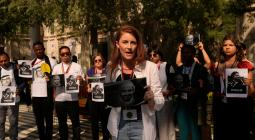Organizers of COP28 want an inclusive summit. But just how diverse is the negotiating table?

Climate activist Lisa NoBaya sat in a room filled with stakeholders at the United Nations climate summit in Dubai and asked the delegates what inclusivity looks like at COP28: does it mean diverse voices are simply present, or actively participating in what the outcome of the talks will look like?
The 28-year-old’s question received affirmative nods from across the room. Many women, young people and Indigenous voices say they feel they're relegated to mere attendance, with limited opportunities to contribute substantially to the decisive meetings, despite promises to make the talks more inclusive. Even attendance at the talks is lopsided, making meaningful inclusion even more difficult, they say.
“If by inclusivity they mean that the women, youth and Indigenous community is just to be present here and not speak then this is not inclusive, but ridiculous,” NoBaya said.
COP28 President Sultan al-Jaber previously promised to ensure that this year’s climate summit will be the most inclusive and action-oriented yet and will bring in perspectives from all sides of the debate — from voices like young activists but also fossil fuel companies, the latter drawing fierce criticism from environmentalists.
Hindou Oumarou Ibrahim, a negotiator from Chad, said it's not just about how many women are in the halls but how many are in charge. At last year's summit, it was two women who lead the way for the talks' biggest win: securing a fund for loss and damage from climate disasters for developing nations.
Of the 133 world leaders who gave speeches at the first few days of COP28, only 15 were women. It was improvement from the previous year, where only seven of 110 leaders attending were women. Among delegates, only 38% were women, according to the U.N. Framework Climate Change Convention data on registration of delegates, three percentage points higher than last year.
There were some visible attempts at inclusion from presidency: When al-Jaber announced ministerial pairings to lead parts of negotiations, five of the eight ministers were women, and three of them were from global south nations. But overall, women are still underrepresented in negotiations, delegates say.
“We do not even have one-tenth of women representation here," Oumarou Ibrahim said. “We have women experts on all climate actions, women dealing with technology, we have women politicians. But why are they not here? Why are they not at the decision-making tables?”
Jeniffer Corpuz, an Igorot leader from the Philippines and policy lead at the non-profit Nia Tero, said there is inclusivity in the outside spaces — like demonstrations and side events — but not so much in the inside spaces of the COPs where the real decision-making happens. Corpuz is present in the closed-door negotiation meetings.
“There are historical circumstances which has put us in this situation with not enough power,” Corpuz said.
Sara Omi, a delegate representing the Emberá People of Panama, said women’s participation in the dialogues is still largely invisible.
“Our participation is crucial because we the women are the ones who keep alive the resistance of our people, we are the keepers of ancestral knowledge that is transmitted from generation to generation. We are also the one’s fighting for the food security of our people. We need for women to effectively be included in all dialogues,” she said.
Omi suggested that inclusion needs to start within country delegations, and added that there's hope things can change. She looked toward her own story as an example and said her nation's encouragement helped get her a seat at the table.
“I have been sent to the negotiation table because they trust me and my capability to ensure what is best for my country," she said of her role. “Now when I talk, men listen.”
___
EDITOR’S NOTE: This article is part of a series produced under the India Climate Journalism Program, a collaboration between The Associated Press, the Stanley Center for Peace and Security and the Press Trust of India.








